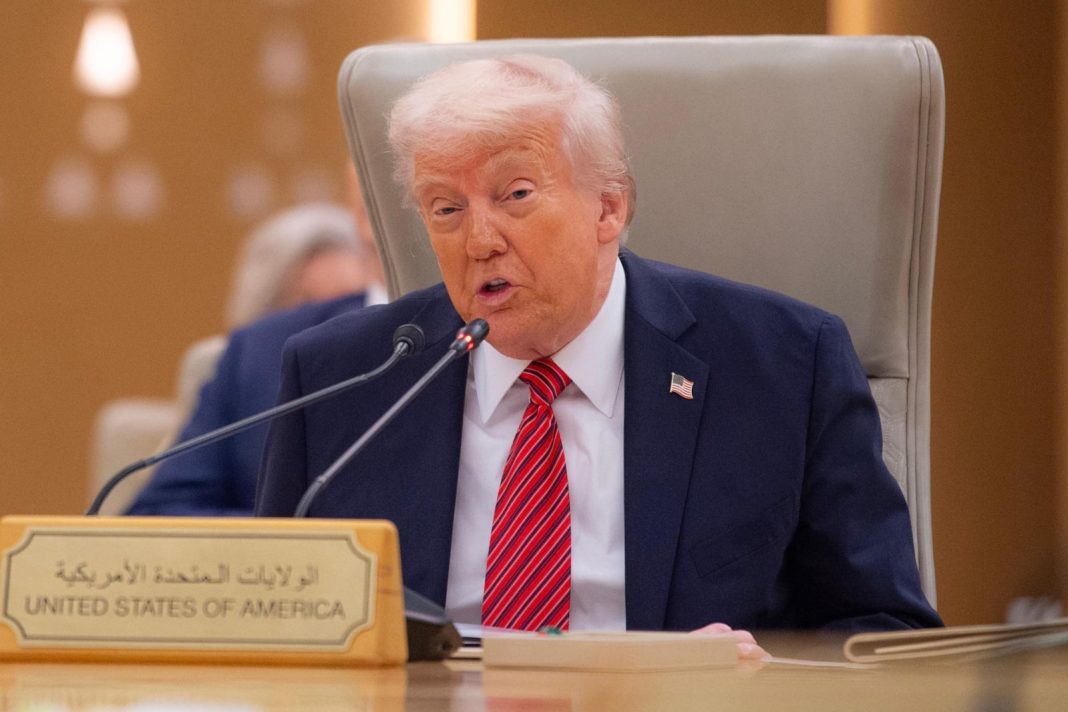U.S. President Donald Trump stated he plans to converse with Russian leader Vladimir Putin and Ukrainian president Volodymyr Zelensky, along with NATO officials, on Monday in hopes of halting the ongoing conflict. This move comes as Russia continues its assault on Ukraine on Saturday.
In a posting on his Truth Social platform, Trump announced he would be speaking via telephone with Putin at 10 AM (1400 GMT) on Monday and then plans to have discussions with Zelensky as well as several NATO member countries afterward.
Shortly before the announcement, Russia intentionally targeted civilians with a drone strike on a bus in the border town of Bilopilia within the Sumy region, resulting in nine fatalities, according to Zelensky.
“Every victim was a civilian. The Russians couldn’t have missed knowing what type of vehicle they were aiming at. This constituted a targeted attack on innocent people,” he stated in a tweet posted alongside an image of a demolished van.
Seven individuals sustained injuries. According to Zelensky, they experienced burns along with fractured bones.
The assault occurred one day following Russian-Ukrainian negotiations intended to halt the conflict in Ukraine, which began over three years prior due to Russia’s initiation of hostilities.
Zelensky stated that he viewed the assault as additional evidence indicating Russia’s lack of interest in a truce. He called for increased pressure through stricter sanctions against Moscow with the aim of halting the bloodshed.
The British Foreign Minister David Lammy likewise denounced the assault.
“Astonished by Russia’s assault in Sumy, just moments after discussions in Türkiye,” Lammy shared on X, employing an alternate spelling of Turkey.
“If Putin truly seeks peace, Russia needs to commit to a complete and instant cessation of hostilities, just as Ukraine has,” he stated.
Trump views himself as the crucial negotiator.
Trump, who has long seen himself as a dealmaker, had said that he would end the Russia-Ukraine war even before he took office, which was nearly four months ago.
During his speeches in the Middle East last week, Trump informed journalists that a deal wouldn’t materialize without his involvement. However, he chose not to attend discussions in Turkey involving Ukraine and Russia when Putin stated he would not participate.
Following 90 minutes of discussions, both Ukraine and Russia consented to an exchange involving 1,000 prisoners per side.
In his Saturday post on Truth Social, Trump reiterated what he had mentioned during discussions in Abu Dhabi, which primarily revolved around business dealings, stating that the conflict sees 5,000 people losing their lives every week.
He stated: “THE TOPICS OF THE APPEAL WILL INCLUDE HALTING THE ‘MASSACRE’ WHICH CLAIMS, ON AVERAGE, OVER 5000 RUSSIAN AND UKRAINIAN SOLDIERS EACH WEEK, AS WELL AS DISCUSSIONS ON TRADING.”
Trump expressed hope that the talks would amount to a “PRODUCTIVE DAY” and that a ceasefire will be agreed to so this “VERY VIOLENT WAR” can end.
He emphasized that the war “NEVER SHOULD HAVE TAKEN PLACE.”
The conflict began on February 24, 2022, when Russia initiated a comprehensive assault on its neighbor, Ukraine. Despite receiving backing from the West, Ukraine has lately found itself retreating defensively across multiple battlefronts, notably following the substantial decrease in U.S. military assistance to Kyiv during the administration of President Trump.
Trump and Putin have already spoken twice since Trump took office in January: once in mid-February and again in mid-March.
In the discussion held in March, Putin consented to a U.S. suggestion to cease all assaults on Ukraine’s energy facilities for a period of 30 days, with the condition that Kyiv reciprocated this stance. However, he refrained from agreeing to an overall truce.
Russia’s earlier response
On Saturday morning, Russian Foreign Minister Sergei Lavrov had a conversation with US Secretary of State Marco Rubio regarding the outcomes of the talks with Ukraine in Istanbul, according to the Russian Foreign Ministry.
As stated by the ministry, the discussion was initiated by the United States.
It was mentioned that Rubio had greeted the prisoner swap positively, along with the pact between both parties to share their perspectives on the required conditions for a truce.
Zelensky also marked the approved prisoner swap during a discussion with Canadian Prime Minister Mark Carney.
“We were really anticipating Putin’s presence, but he did not show up. We suspect he is hesitant about engaging in direct bilateral discussions. Regardless, I consider the agreement on prisoner exchanges to be highly significant. The release of one thousand individuals—this number is substantial. My hope is that we achieve this outcome,” stated Zelensky.
Lavrov commended the United States’ contribution to facilitating the discussions in Istanbul. The statement noted, “He reaffirmed Russia’s readiness to keep collaborating with American counterparts in this regard.”
The Kremlin spokesperson, Dmitry Peskov, stated that Russia hasn’t dismissed the possibility of a meeting between Putin and Zelensky. However, he emphasized that significant advancements in their talks would be necessary beforehand, although he provided few specifics about the matter.
Zelensky and other European leaders have condemned Russia for adhering to what they view as an extreme stance—refusing to let Ukraine become part of NATO and demanding the retention of seized territories.
Zelensky
meets with the heads of state from Switzerland and Canada
In the meantime, Zelensky met with Switzerland’s president, Karin Keller-Sutter, along with Carney in Rome. They discussed a potential ceasefire, bolstering support for Ukraine, and the necessity of ramping up pressure on Russia.
Zelensky talked about Swiss firms assisting in funding Ukraine’s rebuilding efforts with Keller-Sutter.
“We appreciate greatly the humanitarian aid offered by your government, particularly the emphasis on what means the most to us: safe havens within our educational institutions, ensuring protection for our children. We are thankful for this help,” said Zelensky to Keller-Sutter.
In his discussion with Carney, Zelensky emphasized the necessity of collaborating closely with allies.
To genuinely attain peace at the earliest, we need to intensify the pressure on Russia and Putin. An unconditional cessation of hostilities remains crucial. This necessity for increased pressure underscores the importance of imposing additional sanctions.






